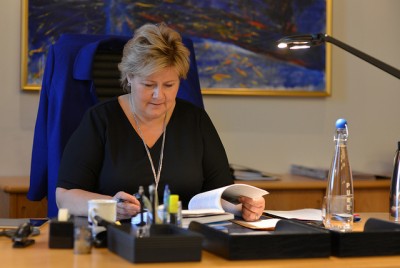Prime Minister Erna Solberg joined the chorus this week of those who believe costs and prices in Norway have reached a level that’s becoming unhealthy for the state economy. Several new economic outlooks, meanwhile, continue to suggest that Norway is heading for tougher times ahead.

Solberg was so eager to defend her new conservative government’s budget proposals during debate in Parliament this week that she broke a glass while speaking from the podium. She contends that tax relief and market liberalization measures included in the proposed state budget should stimulate the economy and competition, and perhaps bring prices down.
Opposition leader and former prime minister Jens Stoltenberg firmly disagreed, claiming that the new government’s willingness to use more oil revenues to help fund major public works projects and infrastructure improvements is not the answer to high costs and high reliance on an oil-fueled economy. Solberg’s budget, though, doesn’t call for any more proportional use of the country’s oil fund than Stoltenberg’s initial budget, submitted before his government had to resign last month, and the government could tap into a lot more oil money if it wanted to.
Warning signals
On Friday, Norway’s central bank (Norges Bank) released the third major economic outlook report of the week that warns of a downturn ahead. Norwegian Broadcasting (NRK) reported that growth has slowed, according to contact companies in the bank’s regional network, and the companies predict weak growth prospects for the year ahead.
Export industries are reporting stability, likely aided by the recent reduction in the strength of the Norwegian currency, the krone. Hardest hit are the retailing industry, real estate and homebuilding, with housing prices already declining (albeit from record-high levels that severely challenge affordability) and sales of new houses falling as well. Companies in the building branch have the lowest expectations for 2014, adjusting their growth prospects downwards the most.
Earlier in the week, employers’ organization NHO and the finance industry’s organization FinansNorge released surveys showing an abrupt mood shift among consumers. FinansNorge reported that consumers haven’t appeared so careful since 1994, when Norway bottomed out of poor economic times that were climaxed by a bank crisis in the early 1990s. NHO’s roughly 2,000 member companies also predicted a slowdown in 2014.
Retailers fear the media, in reporting the gloomier economic outlooks, will scare consumers into dropping their shopping, with prospects for the upcoming Christmas shopping season modest at best. “Folks can’t get so worried that they adjust their consumption too much,” Vibeke Hammer Madsen of the retailers’ trade association Virke told NRK. “We need people to spend money, otherwise it will hit the job market and more people will become unemployed.”
Unemployment up again
New figures from state welfare and employment agency NAV show that unemployment rose for the fifth month in a row, with a thousand more persons officially out of work in November. The unemployment rate remains very low at 2.6 percent, not least compared with the rest of Europe, but that’s up from 2.3 percent in November of last year.
Even though inflation also remains low, food prices have risen in recent months and housing prices and rents are higher than ever. FinansNorge’s survey reported that Norwegians are now using their money to pay down debt and put money into savings accounts instead of spending it on travel, new appliances and other consumer goods.
Cost levels in Norway continue to hurt international competitiveness, which is Solberg’s major concern. “It looks like we’ve hit the wall when it comes to our cost levels,” Solberg said during the budget debate. That’s why she wants to roll back import tariffs like those on meat and cheese, reform strict and expensive employment rules for companies and offer some tax relief, to reduce costs that get passed on in prices and that “affect our competitive abilities against the rest of the world when we produce goods and services.”
Other less reform-minded parties that want to retain much of Norway’s protectionism, like the Christian Democrats, the Center Party and Socialist Left, disagree, claiming that the Norwegian economy remains relatively robust and shouldn’t be made to look troubled.
newsinenglish.no/Nina Berglund

